The Belle Isle gas turbine was installed in 1949 and was the first gas turbine built in the United States for the purpose of generating electric power. Its low cost and consistency aroused considerable interest in the electric utility industry, both here and abroad.
Civil
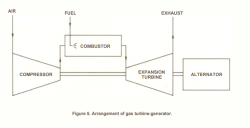
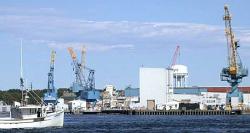
The Portsmouth Navy Yard is a United States Navy shipyard in Kittery on the southern boundary of Maine near the city of Portsmouth, New Hampshire. Founded in 1800, PNS is U.S. Navy's oldest continuously operating shipyard. Today, most of its work concerns the overhaul, repair, and modernization of submarines. he Portsmouth Naval Shipyard was established on June 12, 1800, during the administration of President John Adams.
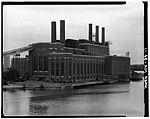
The Edger station was the first steam electric plant produced that could tolerate over 1000 psi of pressure. Initially conceived by Mr. Irving Edwin Moultrop, then Assistant Superintendent, Construction Bureau of the Edison Electric Illuminating Company of Boston. He guided his company and the electric utility industry on a major step forward into the higher-pressure range of 1,200 psi steam.
Duck Creek Aqueduct is a rare surviving example of a covered timber aqueduct. It was one of several similar structures on the Whitewater Canal, which operated between the Whitewater Valley and the Ohio River from 1839 to 1865. After being displaced by the railroad, the canal supplied hydraulic power for the industrial districts at Metamora and Brookville.
Doe River Bridge is a fine example of a timber Howe truss, one of the most widely-used timber bridge designs. Built in 1884, this structure played an integral role in the development of the City of Elizabethton, Tennessee, and it is a rare example of a covered bridge that survives in an urban setting.
The original contract specified the unusual hip roof design, which resembles covered bridges in central Europe. The structure is very well-maintained and still carries automobile traffic. The bridge was restored in 2003.
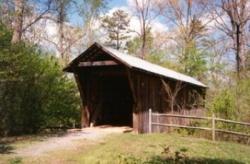
Bunker Hill Bridge is the only surviving Haupt truss bridge in the U.S. and one of only two surviving covered bridges in North Carolina. Patented in 1839, the Haupt truss featured diagonal braces spanning multiple panels, which was an attempt to eliminate the cross-strain found in lattice truss bridges. Although it was almost immediately eclipsed by the Howe truss and never reached the mainstream of covered bridge building, the Haupt truss is of interest for its association with Gen.
The Ashuelot Covered Bridge is located at the center of Ashuelot, NH. It is a Town lattice truss bridge, spanning the Ashuelot River in a roughly north-south orientation. It consists of two spans with a total length of 178 feet (54 m). The total width of the bridge is 29 feet (8.8 m), and has a central roadway and sidewalks (measuring 3'10" in width) on each side. The bridge rests on stone abutments and a central pier. The abutments have been reinforced with concrete since the bridge was built, and the central pier has been protected by a metal breakwater.
Ackley Bridge is an excellent example of a multiple kingpost truss and a noteworthy early example of covered bridge preservation efforts in the United States. Built in 1832 by Joshua Ackley (b.1805) and Daniel Clouse (b.1812), Ackley Bridge originally spanned Enslow’s Branch of Wheeling Creek between Greene County and Washington County in Pennsylvania, where it carried traffic for over a century.
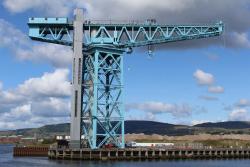
The Titan is a 200-ton electrically driven hammerhead cantilever crane, the earliest survivor of this type. It is now all that remains of the once great John Brown Shipyard in Clydebank near Glasgow where many of the world's great ships were built. Designed and constructed by Sir William Arrol and Co. Ltd., Glasgow, Scotland, in 1907 the Titan set the standard for many more similar cranes to be erected worldwide. It has been restored and opened as a tourist attraction in 2007.

Spearheaded by Chief Engineer William J. Wilgus and constructed under challenging conditions with no interruption of existing train service, Grand Central Terminal was a triumph of innovative engineering in the design of urban transportation centers. Its novel, two-level station, made possible by electric traction, streamlined both train and passenger movement by separating long-haul and suburban traffic and employing an extensive system of pedestrian ramps throughout the facility.
Innovations
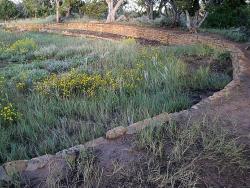
Four prehistoric reservoirs at Mesa Verde National Park were constructed and used between AD 750 and AD 1180. They are: Morefield Reservoir (in Morefield Canyon), Far View Reservoir (on Chapin Mesa), Sagebrush Reservoir (on an unnamed mesa), and Box Elder Reservoir (in Prater Canyon). These four…
Read More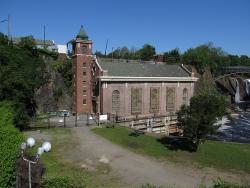
Visionary Alexander Hamilton, the United States' first Secretary of the Treasury, visited the Great Falls of the Passaic River with George Washington in 1778. The 77-foot-high, 280-foot-wide waterfall inspired his dream of abundant, inexpensive energy as the means for economic independence from…
Read More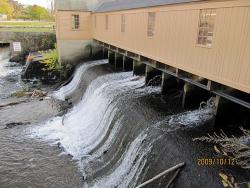
Much of the sophisticated system of canals, dams, gates, and tunnels built to manage water power in 19th-century Lowell is preserved today as the basis of the Lowell National Historical Park and the Lowell Heritage State Park. Pictured above is the Boott Penstock, an early channel adjacent to…
Read More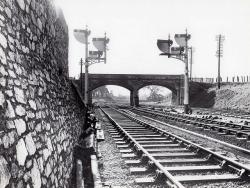
In the early 1830s, the merchants of Bristol, long dissatisfied with their communication with London, began to wonder if the new railroad technology might be a solution to their problem. The Bristol Chamber of Commerce, the Merchant Adventurers and other local industrial bodies formed a…
Read More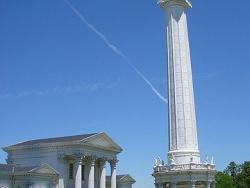
In the 18th century, French architect Claude-Nichols Ledoux was known for forging architectural beauty with industrial efficiency. One hundred years later his vision was given new life through the design of the Louisville Water Company Pumping Station. Inspired by Ledoux's Royal Salt Works at…
Read More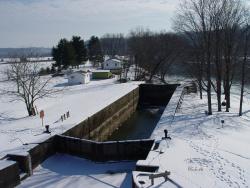
Most of the locks were 184 feet long and 36 feet wide, able to handle boats up to 160 feet long. The sandstone locks (along with wood miter gates, rock-filled timber-crib dams and bypass canals with guard gates) created a slackwater navigation system stretching over 90 miles.
…
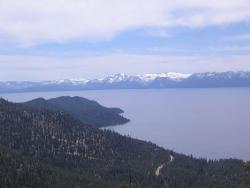
In the mid-1800s Virginia City was America's greatest producer of high-grade silver and gold ore. When mining activities began, natural springs provided water to the camps. As the population grew, the Virginia and Gold Hill Water Company was formed to address the need for more water. The company…
Read More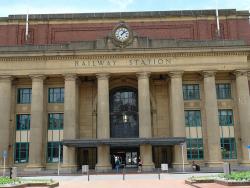
The North Island Main Trunk Railway permitted overland travel and development of the New Zealand hinterland. Built under challenging conditions and over difficult terrain, all cuts, fills, and tunneling were minimized by careful use of the topography and by innovative engineering.
Over…
Read More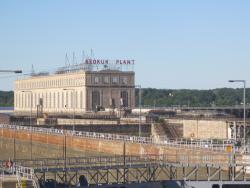
Spearheaded by Hugh Cooper, the Keokuk Dam & Power Plant served as a prototype for many future power plants. The project harnessed the hydropower of the Mississippi River, between Keokuk, Iowa and Hamilton, Illinois.
The crest of the dam is nearly a mile long. The dam structure…
Read More
The 1.6-mile Holland Tunnel was the first underwater vehicular crossing of the Hudson River and the first tunnel specifically designed for automobiles and trucks. It dramatically reduced the time required to traverse the Hudson River, a trip previously possible only by ferry.
A major…
Read More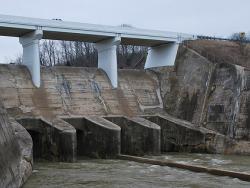
The Miami Conservancy District flood control project was the direct result of the disastrous flood of 1913, when waters from the Miami, Stillwater, and Mad rivers flooded Dayton and surrounding communities in the Miami Valley. More than 400 lives were lost and property damage exceeded $100…
Read More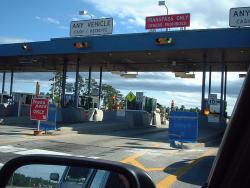
Maine's heavy snows led turnpike maintenance personnel to bring "left-handed" snow plows into prominence. By using left-handed and traditional right-handed plows in tandem, they were able to distribute snow more evenly - an important advance that has been emulated by many highway maintenance…
Read More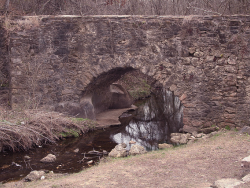
This is one of the earliest uses of engineered water supply and irrigation systems in the United States. The first of eight original acequias was under construction in 1718 and two are still in operation. The remains of one are visible on the grounds of the Alamo. The Acequias of San Antonio are…
Read More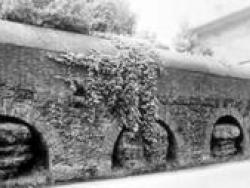
The roman emperor Trajan ordered a new aqueduct be built to bring fresh water to Italy's Trastevere region and parts of Rome. The water is collected from five springs that feed the lake at Bracciano, and traverses over 25 miles into Rome. To maintain an even gradient, the aqueduct follows a…
Read More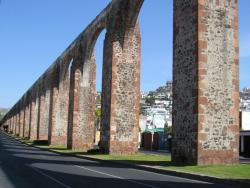
Queretaro's aqueduct, in Central Mexico, is one of the most eloquent symbols of colonial Mexico. As one of the early major hydraulic engineering projects in North America, it defines the city both nationally and internationally. The aqueduct, designed in 1723 by Juan Antonio de Urrutia y Arana,…
Read More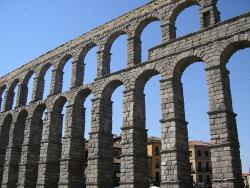
For 2,000 years, Aqueducto de Segovia has been conveying drinking water from the Frio River to Segovia, approximately 18 kilometers away. Built under the reign of Roman emperor Trajan, the aqueduct is one of the most intact and best-preserved Roman engineering masterpieces. Roman engineers built…
Read More
The Alaska Highway, initially called the Alaskan-Canadian (Alcan) Military Highway, provided an essential transportation link to the Yukon and Alaska during World War II. It begins at the junction with several Canadian highways in Dawson Creek, British Columbia and runs to Delta Junction, Alaska…
Read More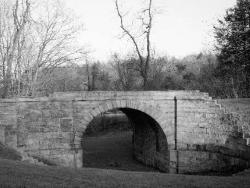
In an era when roads and canals were the most common means of overland transportation, the Allegheny Portage Railroad provided a novel alternative. The railway carried fully-loaded canal boats over the steep grades of the Allegheny Mountain. The 36-mile system rose almost 2,300 feet above sea…
Read More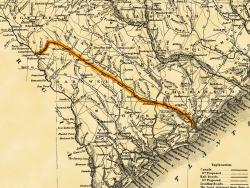
Built with a single set of tracks consisting of hardwood rails and wooden ties, and using wooden trestles to carry it over low-lying areas, the 136-mile Charleston-Hamburg Railroad was one of the longest railroads in the world when it was completed in 1833. It also became the first railroad in…
Read More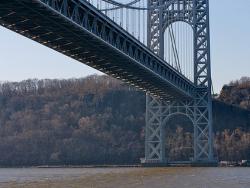
"An essential part of the human experience is to create an aesthetic atmosphere."
The George Washington Bridge represented a departure in suspension bridge design. Chief Engineer O.H. Ammann developed a system of stiffening trusses that offered greater flexibility and saved the project…
Read More

